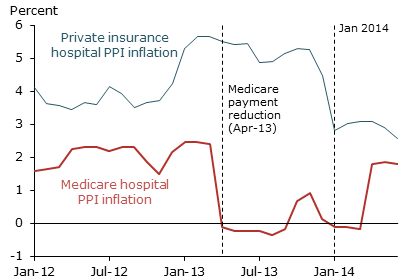In an economic letter from the Federal Reserve Bank of San Francisco, Jeffrey Clemens, Joshua Gottlieb, and Adam Shapiro make the case that Medicare cuts in rates paid to hospitals induce private insurer cuts. They focus on the 2% reduction in Medicare payments after April 1, 2013, as required by the Budget Control Act of 2011 (sequestration).
Here’s the key chart:
Consistent with Figure 1, we see that Medicare price inflation dropped sharply in April 2013—2.5 percentage points between March and April 2013. Over the subsequent year, private-sector price inflation declined during the months associated with substantial numbers of contract renegotiations. Specifically, private PPI inflation fell 0.6 percentage point in July 2013 and 1.6 percentage points in January 2014. These facts suggest that Medicare’s payment cuts systematically passed through into the private payment system.
One should not be impressed with some speculative chart reading. Are there any studies, with stronger methods, that support the idea that private prices paid to hospitals fall when Medicare’s do so?
A study of this relationship in the hospital setting by White (2013) estimates that a 10% reduction in Medicare’s hospital payments results in a 4 to 8% reduction in private payments. White and Wu (2013) further find that hospitals handle these cuts by reducing their operating costs; this and related findings are summarized in Frakt (2013).
In the context of physician payments, Clemens and Gottlieb (2013) estimate the effects of changes in Medicare’s regional payment adjustments. They find that a $1 reduction in Medicare’s payments results, on average, in a $1 reduction in private payments. Since the average private payment exceeds the average Medicare payment by 40% in their study, the results imply that a 1% reduction in Medicare payments reduces private payments by about 0.7%.
The letter goes on to discuss the timing of private sector price responses to Medicare payment cuts. Evidence suggests it’s spread out over many years. In this way, even a one-time cut to Medicare payments can suppress health care prices more broadly and for longer than one might expect. Click through for the details.



